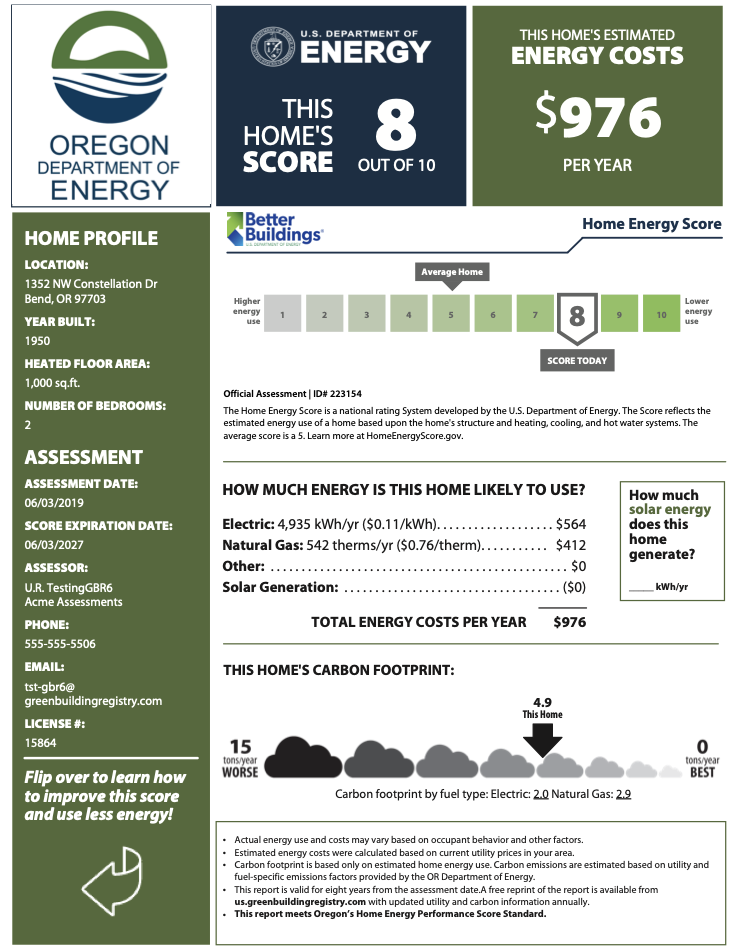Bend’s home energy assessment program launches with few hiccups
Published 4:00 am Sunday, July 30, 2023

- Sample of the first page of a home energy score.
For most of the Bend homes that have come on the market this month, the city’s requirement of a home energy assessment has caused only a few problems.
Many buyers see it as just another tool they can use to know what they’re buying, and sellers just see it as another disclosure form, said Cory Bettesworth, RE/MAX managing principal broker.
“We haven’t had any issues,” Bettesworth said. “It’s being seen as no different than an advisory or disclosure.”
The only real issue that has developed is that the home energy scores are not being posted on other real estate platforms. The score is supposed to appear with the online listing of the home, according to the Bend city ordinance, said Anne Aurand, city of Bend communications director. The city is in the process of reaching out to these platforms and figuring out how to include the scores.
“The hope is over time, more informed buyers make investments that reduce residential energy use,” Aurand said. “The scores are posted in the Multiple Listing Service, but we are finding that the scores are not populating the consumer-facing real estate listings like Zillow or Redfin. We’re trying to fix this.”
How it began
The Home Energy Score Program began July 1 in Bend and is a component of the city’s Community Climate Action Plan, which pledges to reduce the greenhouse gas emissions by 40% by 2030 and by 70% by 2050. Residences contribute 29% to the total greenhouse gas emissions in a community, Aurand said. Homeowners must select from a list of inspectors trained in assessing and completing the energy score forms.
Bend’s mandatory Home Energy Score program effective July 1
In Oregon, the home energy score program is voluntary. The city of Bend joined Portland, Hillsboro and Milwaukie in adopting a mandatory energy scoring program. Other cities considering it, according to the Oregon Department of Energy website, include Eugene, Corvallis, Ashland and Hood River.
An assessment looks at 30 qualities to determine a numerical score, and identifies potential energy-efficient improvements for a given home. Scores will be valid for eight years and are transferrable from owner to owner within that time.
When the city first pitched this energy score requirement, real estate agents were concerned it would limit the number of homes for sale. That hasn’t happened, said Matt Robinson, The Agency Bend principal and managing partner.
City approves mandatory home energy score program for sellers
“We’ve gotten our minds wrapped around the program,” Robinson said. “It’s part of business and not a big deal. It’s more informative than anything. Like seeing the MPG on a new car sticker.”
The home energy assessment costs $150 to $300 for sellers, with an option for low-income assistance, if needed.
How it works
A 4,500-square-foot home, even a new one, might get a lower score than an older 1,500-square-foot home, said Clare Langford, owner of Amerispec Inspection Services, a Bend company that does home and energy inspections.
Inspectors go in and follow a check list provided by the U.S. Department of Energy that looks at things like appliance energy efficiency values, heating and cooling, vent duct work, attics and crawl spaces.
“We’re basically checking boxes and inputting the information into an algorithm,” Langford said. “The biggest component is the square footage of a home and the age.”
The information is stored on a website, Earth Advantage, which supports energy score programs in Oregon, Missouri and New York.
Less than half the homes in Deschutes County were built before 1990, according to the Oregon Energy Department. But more than half are owner-occupied.
The home energy score provides people with more information about the home they’re buying, said Langford. It also can help the buyer understand the role a home plays in a community’s overall greenhouse gas emissions, he said.
“It might be seen as a nuisance now, but maybe in a few years it might help people have a better understanding of how to make their home more energy efficient,” Langford said.
If a city inspector finds a home is not complying with the home energy program, the homeowners will receive a non-compliance notice and be given a 15-day grace period, Aurand said. The goal is to educate the homeowner, not be punitive.
Until the scores can be included in all the real estate platforms online, the city has paused sending notices, Aurand said.
Should a homeowner not comply with in the grace period, a city code enforcement officer can issue a violation that is subject to penalties and fees, according to the ordinance.
Lester Friedman, a managing principal broker at Premiere Property Group LLC, didn’t expect that scores would thwart sales.
“Most likely the scores are not going to have much effect on carbon footprints,” Friedman said. “The buyer’s agent will tell their buyer the score and they’ll choose to make changes or not.”
The Oregon Energy Department provides this information on energy costs to a homeowner. Here’s the information for Deschutes County.
Average Annual Residential Electricity: 16,913 kWh
Average Annual Electricity Cost: $1,464
Average Annual Residential Natural Gas Therms: 759
Average Annual Natural Gas Cost: $572
Electricity and Natural Gas Average Costs (percent of typical income): 4%
Source: Oregon Department of Energy






